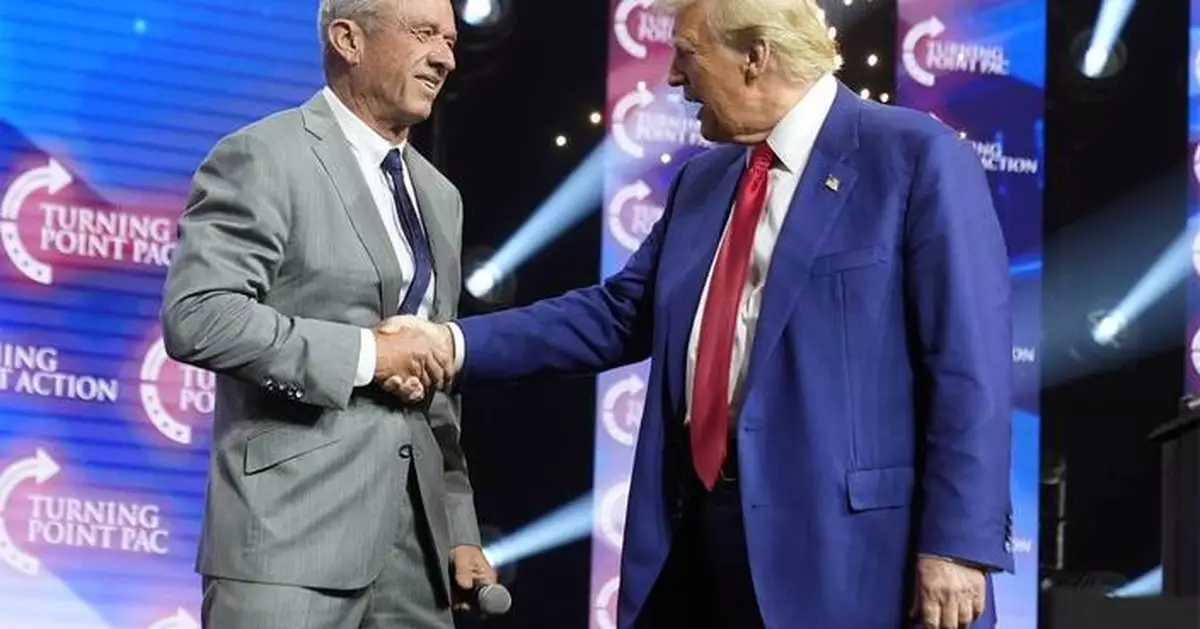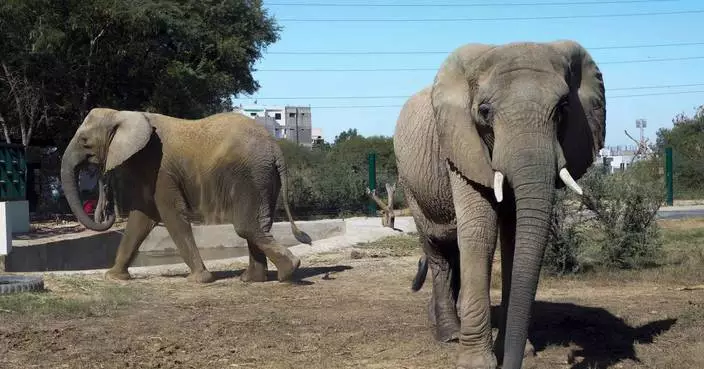WASHINGTON (AP) — The kids seen by Dolores Mejia around suburban Phoenix have been growing heavier in recent years. Their parents, too, she says.
Mejia, a 75-year-old retiree, says she's also had her own weight struggles on the scale.
Click to Gallery
Robert F. Kennedy Jr., President-elect Donald Trump's nominee to be Secretary of Health and Human Services, walks to meet with Sen. Roger Marshall, R-Kan., at the Capitol in Washington, Tuesday, Dec. 17, 2024. (AP Photo/Jose Luis Magana)
Robert F. Kennedy Jr., President-elect Donald Trump's nominee to be Secretary of Health and Human Services, waves to the media as he rides the train to go to meet with Sen. John Thune, R-S.D. at the Capitol in Washington, Tuesday, Dec. 17, 2024. (AP Photo/Jose Luis Magana)
Robert Kennedy Jr., President-elect Donald Trump's pick to lead the Health and Human Services Department, meets with Sen. Tommy Tuberville, R-Ala., on Capitol Hill, Tuesday, Dec. 17, 2024, in Washington. (AP Photo/Mark Schiefelbein)
Robert Kennedy Jr., second from right, President-elect Donald Trump's pick to lead the Health and Human Services Department, rides the Capitol subway as he travels between meetings with senators on Capitol Hill, Tuesday, Dec. 17, 2024, in Washington. (AP Photo/Mark Schiefelbein)
Robert Kennedy Jr., right, President-elect Donald Trump's pick to lead the Health and Human Services Department, meets with Sen. Tommy Tuberville, R-Ala., on Capitol Hill, Tuesday, Dec. 17, 2024, in Washington. (AP Photo/Mark Schiefelbein)
Robert F. Kennedy Jr., President-elect Donald Trump's nominee to be Secretary of Health and Human Services, center, walks to meet with Sen. John Thune, R-S.D. at the Capitol in Washington, Tuesday, Dec. 17, 2024. (AP Photo/Jose Luis Magana)
Robert Kennedy Jr., President-elect Donald Trump's pick to lead the Health and Human Services Department, walks between meetings with senators on Capitol Hill, Tuesday, Dec. 17, 2024, in Washington. (AP Photo/Mark Schiefelbein)
Robert F. Kennedy Jr., President-elect Donald Trump's nominee to be Secretary of Health and Human Services, waves to the media as he rides the train to go to meet with Sen. John Thune, R-S.D. at the Capitol in Washington, Tuesday, Dec. 17, 2024. (AP Photo/Jose Luis Magana)
FILE - Republican presidential nominee former President Donald Trump greets Robert F. Kennedy Jr., at a Turning Point Action campaign rally, Oct. 23, 2024, in Duluth, Ga. (AP Photo/Alex Brandon)
That's why Robert F. Kennedy Jr.'s pledge to “Make America Healthy Again” as he campaigned alongside Donald Trump caught her attention. She liked the questions Kennedy raised about the role of processed foods in America's obesity epidemic.
“I’m a junk food person," said Mejia, an ardent Trump supporter. “I started wondering where those extra pounds came from.”
After hearing Kennedy out, she concluded: “We cannot trust the health organizations we’ve trusted for years to tell us that our foods are safe.”
Republicans such as Mejia have embraced Kennedy, whose alliance with the president-elect could make the prominent environmentalist and vaccine skeptic the nation’s top health official next year. Republicans hold an overwhelmingly positive view of Kennedy, with most approving of Trump’s decision to put him in his administration, according to recent polling from The Associated Press-NORC Center for Public Affairs Research and AP VoteCast, a survey of more than 120,000 voters in the 2024 presidential election.
But Americans overall are less positive about Kennedy, and there isn't broad support for some of his views, which include closer scrutiny of vaccines.
If confirmed by the Senate, Kennedy will be charged with leading the Department of Health and Human Services, a $1.7 trillion agency that researches cancer, approves prescription drugs and provides health insurance for roughly half the country.
About 6 in 10 Republicans approve of Kennedy’s appointment to Trump's Cabinet and only about 1 in 10 disapprove, according to an AP-NORC poll conducted in December, while the rest aren't familiar with him or didn't have an opinion.
Kennedy's talk of healthy foods is what captured the attention of Natalie Moralez, a 32-year-old engineer in Albuquerque, New Mexico, who identifies as an independent.
She likes his promises to take on powerful companies. And she's eager to see him challenge the ingredients they use in the food she finds on supermarket shelves.
“Even just buying foods from the grocery store, like what else is in there?” Moralez said. “That’s my main concern, and hopefully he can figure out what the underlying issues are and see if we can do better.”
Kennedy doesn't fare as well among Americans overall, with about 4 in 10 U.S. adults disapproving and about 3 in 10 approving of his appointment.
Although Kennedy is a member of one of the most powerful Democratic dynasties in the country, most Democrats said they don't like that he's been named to Trump's Cabinet. About 6 in 10 Democrats “strongly disapprove” of the pick, the December poll found. That's a higher share of disapproval than other high-profile picks such as Pete Hegseth to be defense secretary or Marco Rubio for secretary of state.
Kennedy started his career as an environmental lawyer and won big lawsuits against companies over the chemicals used in weed killers and heavy metal smelters.
But in recent years, he's attracted a sizable and loyal following over his claims that vaccines, recommended and championed by the nation's public health agencies, are dangerous. That's despite decades of research, laboratory testing and real-world use that shows childhood vaccinations have prevented millions of deaths.
“There’s no vaccine that is safe and effective,” Kennedy said on a podcast in July 2023. During a Fox News interview the same year, he said he believes a repeatedly discredited idea that vaccines can cause autism. In recent days, Trump has increasingly suggested that the link between autism and vaccines should be studied — although decades of research has already concluded there is no connection between the two.
Trump and Kennedy allies have promised not to take away vaccines, instead saying they oppose government mandates and want to conduct more research on the vaccines.
But about half of voters want the government to be more involved in ensuring children are vaccinated for childhood diseases, according to AP VoteCast.
About one-quarter said the government’s current involvement on this is “about right,” and only about 2 in 10 wanted the government to be less involved. But parents of school-age children were somewhat more likely to support a smaller government role: Roughly 3 in 10 parents of children under 18 wanted the government less involved, compared with about 2 in 10 voters without children under 18.
Among Trump’s voters, about one-third wanted the government less involved in ensuring children are vaccinated for childhood diseases.
A similar share wanted the government more involved, and about 3 in 10 said its involvement was about right. Roughly 4 in 10 Trump voters who are parents of children under 18 said they want the government less involved in ensuring children are vaccinated, while about one-third said they wanted it more involved.
Kennedy’s anti-vaccine nonprofit group, Children’s Health Defense, currently has a lawsuit pending against a number of news organizations, among them the AP, accusing them of violating antitrust laws by taking action to identify misinformation, including about COVID-19 and COVID-19 vaccines. Kennedy took leave from the group when he announced his run for president but is listed as one of its attorneys in the lawsuit.
People who voted in the presidential race this November held divided views on Kennedy, according to AP VoteCast.
Kennedy had dropped out of the presidential race by that point, throwing his support behind Trump, but remained on the ballot in some states.
About 4 in 10 voters had a very or somewhat favorable opinion of Kennedy, and roughly 4 in 10 had a very or somewhat unfavorable view. Slightly more than 1 in 10 did not know enough about Kennedy to have an opinion.
Republican voters — about two-thirds — were more likely to hold a favorable view of Kennedy, much higher than the roughly 2 in 10 Democrats who viewed him positively. Meanwhile, about 7 in 10 Democrats had a negative opinion of Kennedy, with about half saying they had a “very unfavorable” view.
The AP-NORC poll of 1,251 adults was conducted Dec. 5-9, 2024, using a sample drawn from NORC’s probability-based AmeriSpeak Panel, which is designed to be representative of the U.S. population. The margin of sampling error for adults overall is plus or minus 3.7 percentage points.
AP VoteCast was a survey of the American electorate conducted by NORC at the University of Chicago for Fox News, PBS NewsHour, The Wall Street Journal and The Associated Press. The survey of more than 120,000 voters was conducted for eight days, concluding as polls closed. Interviews were conducted in English and Spanish. The survey combines a random sample of registered voters drawn from state voter files; self-identified registered voters using NORC’s probability based AmeriSpeak panel, which is designed to be representative of the U.S. population; and self-identified registered voters selected from nonprobability online panels. The margin of sampling error for voters overall is estimated to be plus or minus 0.4 percentage points. Find more details about AP VoteCast’s methodology at https://ap.org/votecast.
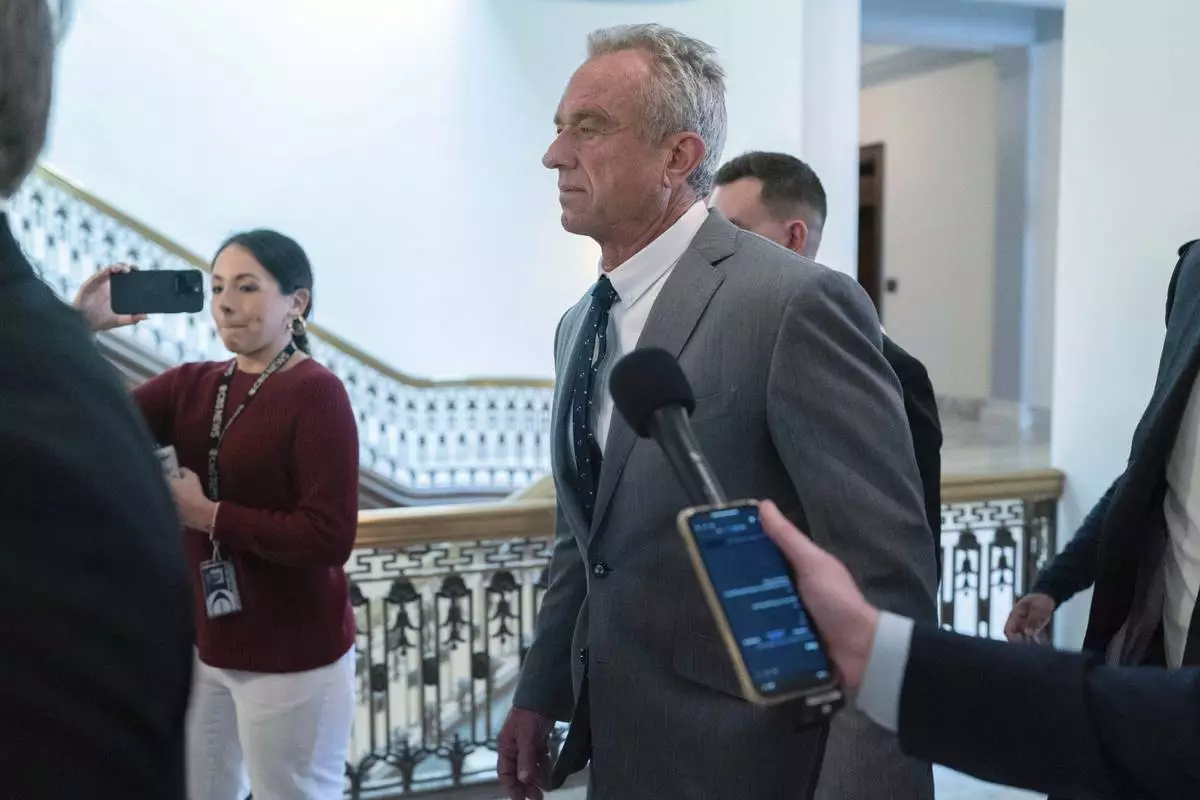
Robert F. Kennedy Jr., President-elect Donald Trump's nominee to be Secretary of Health and Human Services, walks to meet with Sen. Roger Marshall, R-Kan., at the Capitol in Washington, Tuesday, Dec. 17, 2024. (AP Photo/Jose Luis Magana)
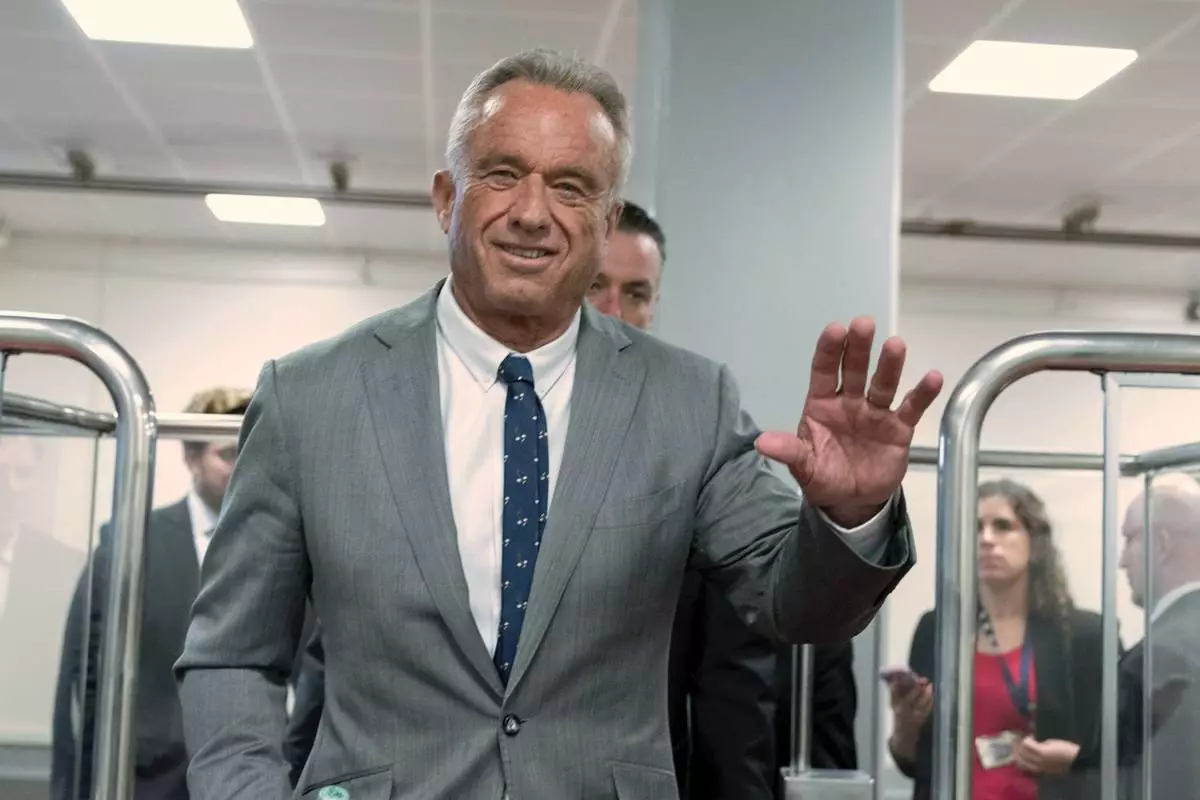
Robert F. Kennedy Jr., President-elect Donald Trump's nominee to be Secretary of Health and Human Services, waves to the media as he rides the train to go to meet with Sen. John Thune, R-S.D. at the Capitol in Washington, Tuesday, Dec. 17, 2024. (AP Photo/Jose Luis Magana)
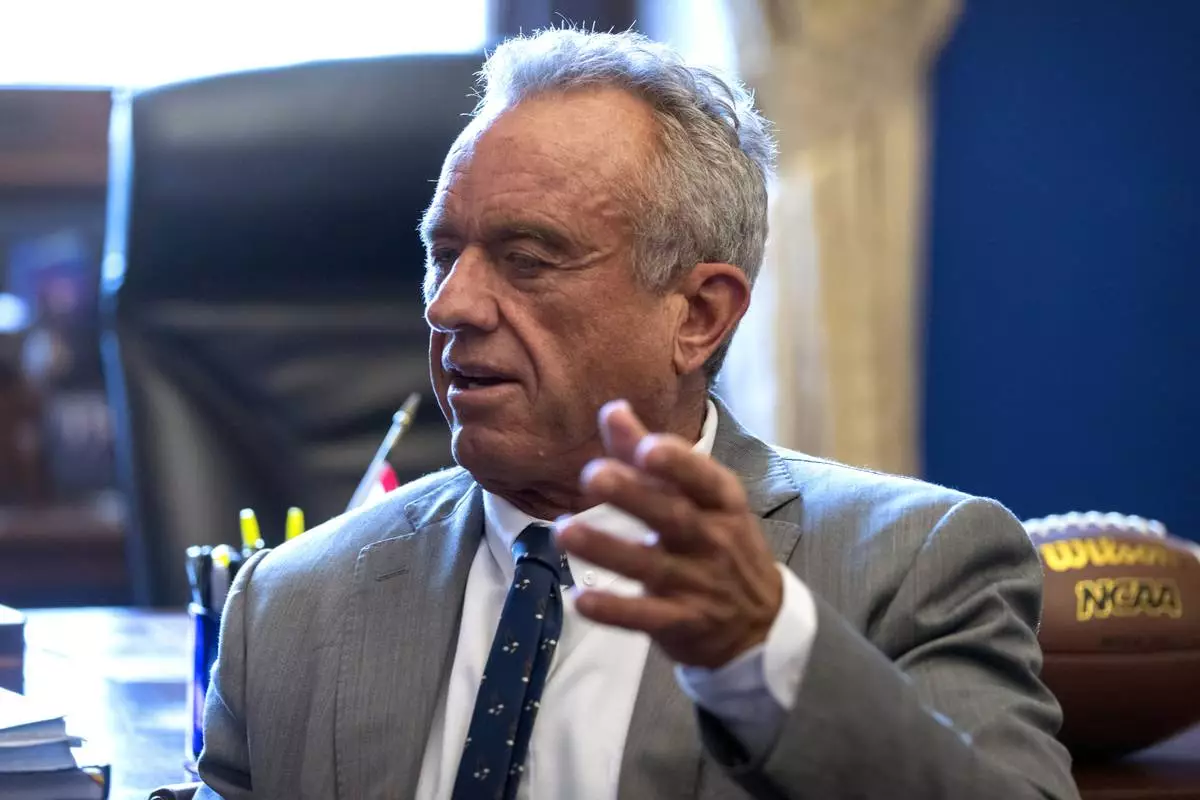
Robert Kennedy Jr., President-elect Donald Trump's pick to lead the Health and Human Services Department, meets with Sen. Tommy Tuberville, R-Ala., on Capitol Hill, Tuesday, Dec. 17, 2024, in Washington. (AP Photo/Mark Schiefelbein)

Robert Kennedy Jr., second from right, President-elect Donald Trump's pick to lead the Health and Human Services Department, rides the Capitol subway as he travels between meetings with senators on Capitol Hill, Tuesday, Dec. 17, 2024, in Washington. (AP Photo/Mark Schiefelbein)
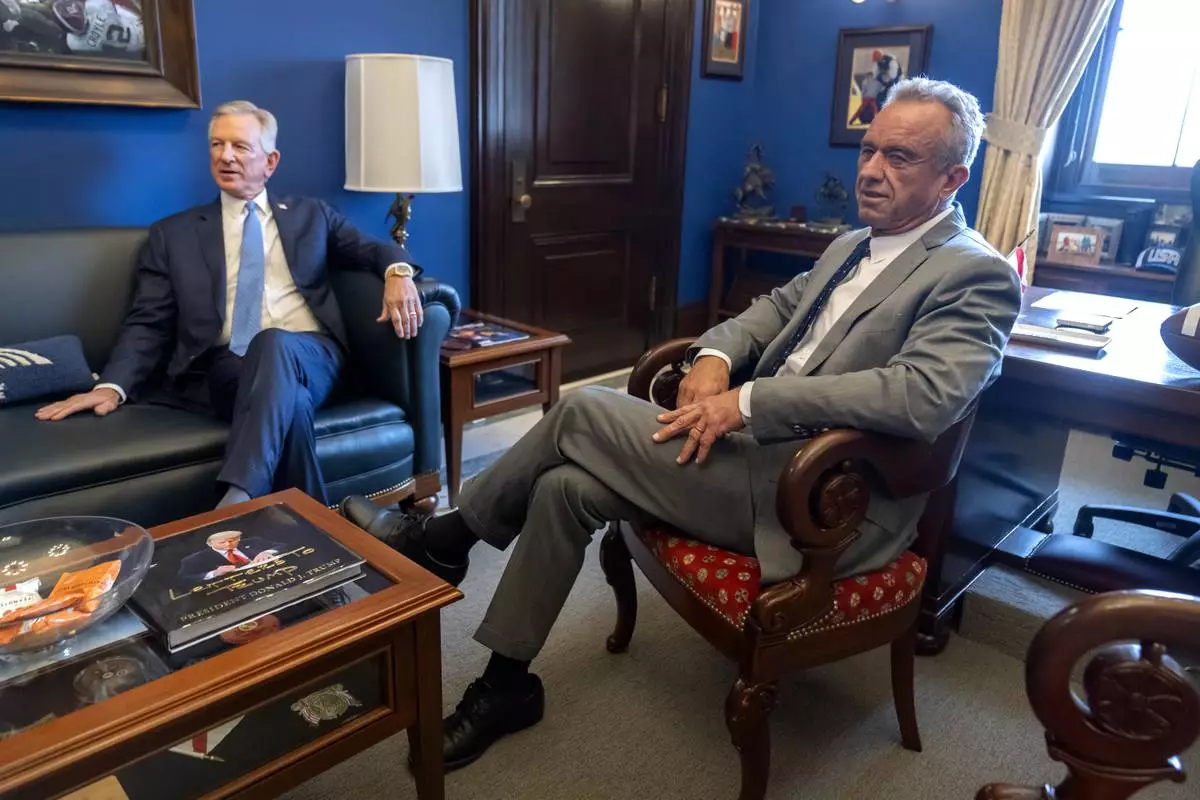
Robert Kennedy Jr., right, President-elect Donald Trump's pick to lead the Health and Human Services Department, meets with Sen. Tommy Tuberville, R-Ala., on Capitol Hill, Tuesday, Dec. 17, 2024, in Washington. (AP Photo/Mark Schiefelbein)

Robert F. Kennedy Jr., President-elect Donald Trump's nominee to be Secretary of Health and Human Services, center, walks to meet with Sen. John Thune, R-S.D. at the Capitol in Washington, Tuesday, Dec. 17, 2024. (AP Photo/Jose Luis Magana)
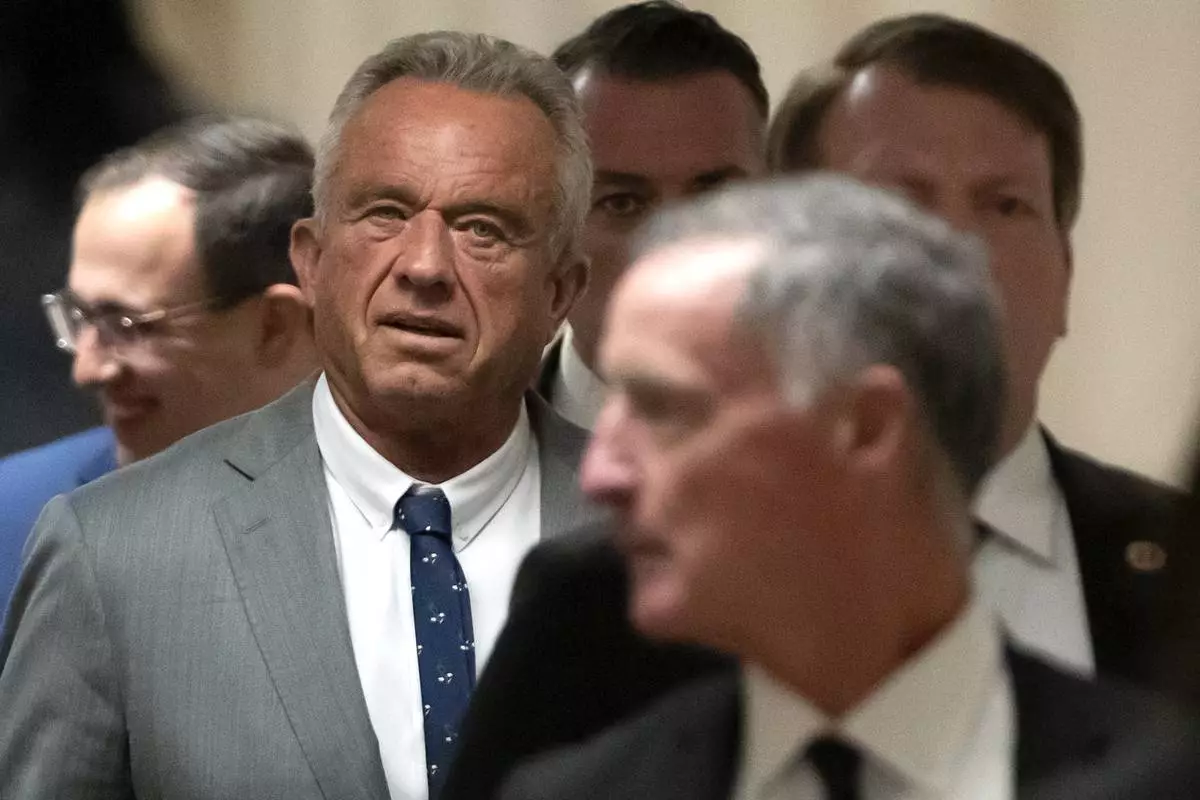
Robert Kennedy Jr., President-elect Donald Trump's pick to lead the Health and Human Services Department, walks between meetings with senators on Capitol Hill, Tuesday, Dec. 17, 2024, in Washington. (AP Photo/Mark Schiefelbein)
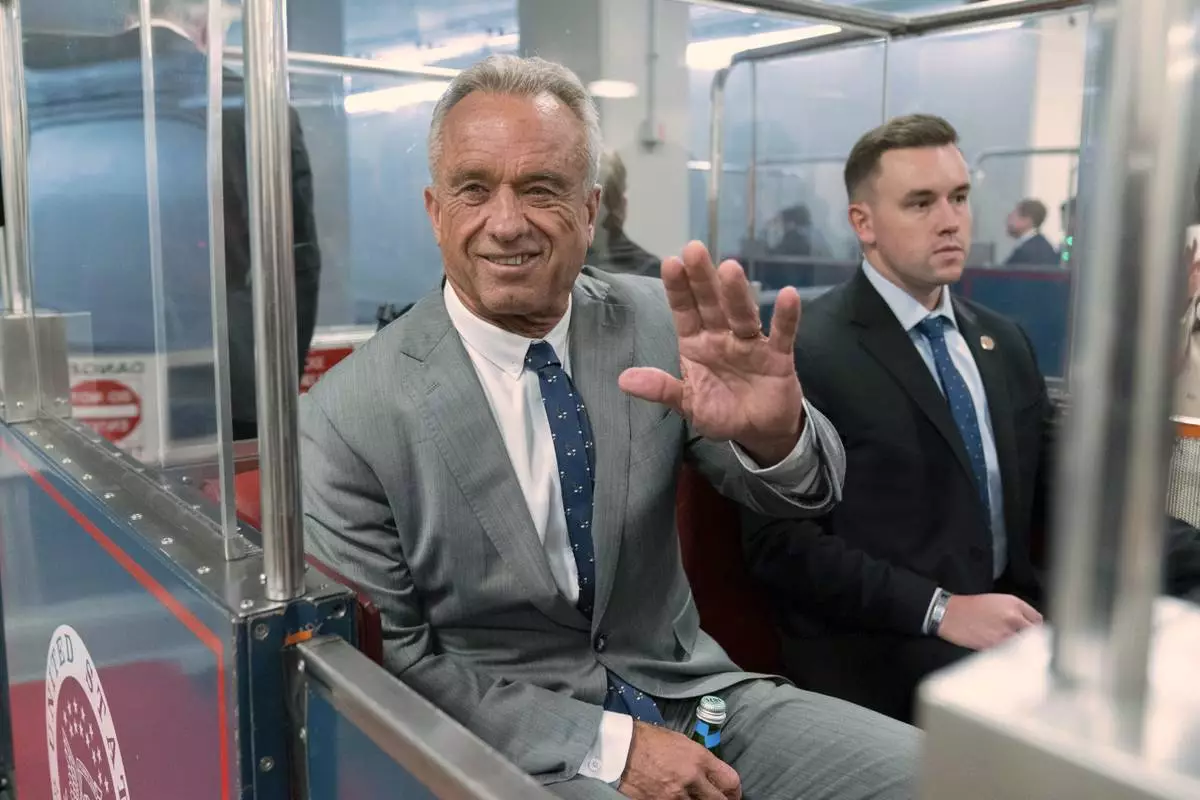
Robert F. Kennedy Jr., President-elect Donald Trump's nominee to be Secretary of Health and Human Services, waves to the media as he rides the train to go to meet with Sen. John Thune, R-S.D. at the Capitol in Washington, Tuesday, Dec. 17, 2024. (AP Photo/Jose Luis Magana)
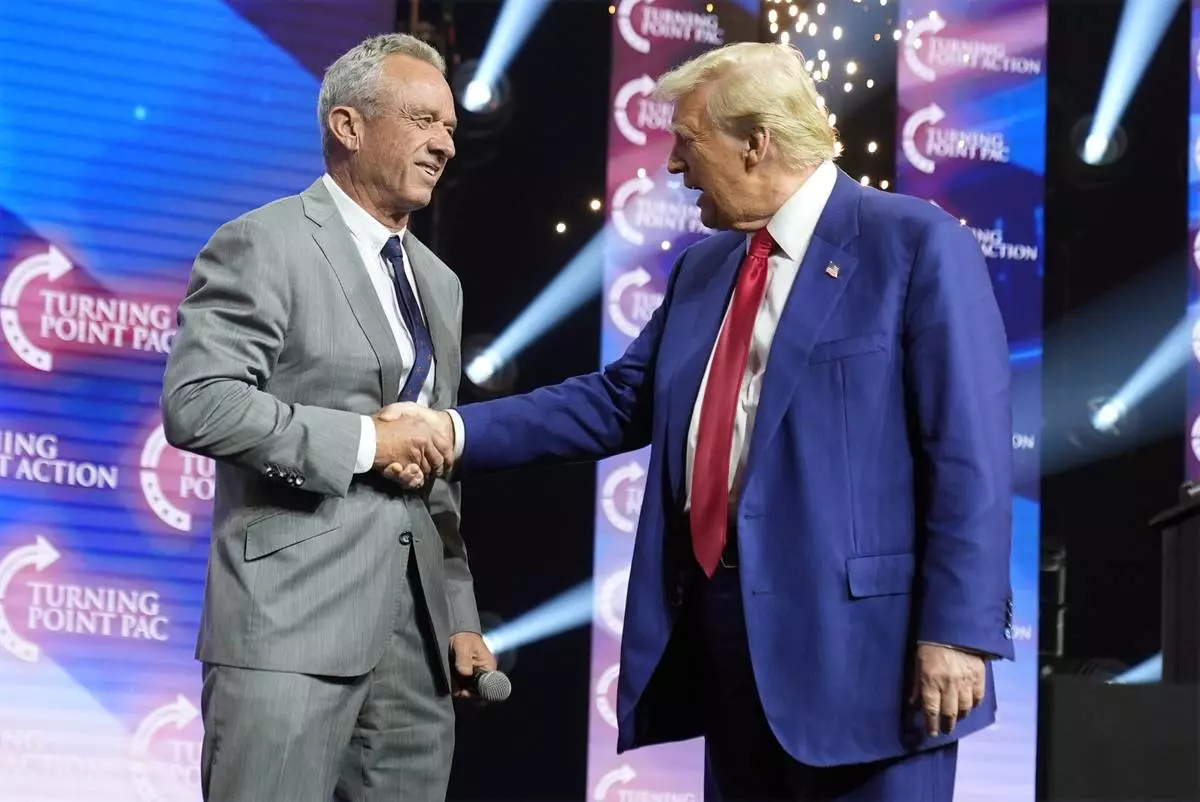
FILE - Republican presidential nominee former President Donald Trump greets Robert F. Kennedy Jr., at a Turning Point Action campaign rally, Oct. 23, 2024, in Duluth, Ga. (AP Photo/Alex Brandon)
One of President-elect Donald Trump 's most popular talking points during his campaign centered on the future of transgender athletes.
Trump revisited the topic multiple times in the months and weeks before the election, suggesting at his rallies that one of the goals of his second term would be to “keep men out of women's sports." Millions were spent on advertising that turned something that affects a tiny minority of competitors into a wedge issue.
More than half of voters overall — and the vast majority of Trump supporters — said support for transgender rights in government and society has gone too far, according to AP VoteCast, a survey of more than 120,000 voters nationwide.
What, exactly, Trump will do when he takes office on Jan. 20 is unclear. His transition team has not divulged any specifics, though the president-elect said during his campaign that the process would be “easy.”
In some ways, it might be. In others, things could be far murkier.
A lot. Trump seemed to identify the discussion around the rights of transgender people in general and trans athletes in particular as one that could garner both attention and support that went beyond his usual base.
Trump would often use language about gender identity that LGBTQ+ advocates say is wrong and harmful. He also falsely labeled two Olympic female boxers as men, and said their ability to participate in the Paris Games was “demeaning to women” even though both Imane Khelif of Algeria and Li Yu-ting of Taiwan were assigned female at birth and identify as women.
Trump ramped up the rhetoric as election day approached, telling the crowd at a Madison Square Garden rally in October: “We will get ... transgender insanity the hell out of our schools, and we will keep men out of women’s sports."
Trump has said on Day 1 that he would cut federal funding to "any school pushing critical race theory, transgender insanity, and other inappropriate racial, sexual or political content on our children.”
There are several layers to this, but the most immediate would be how his administration interprets Title IX, the law best known for its role in pursuing gender equity in athletics and preventing sexual harassment on campuses.
Every administration has the authority to issue its own interpretations of the landmark legislation. The last two presidential administrations — including Trump’s first — offer a glimpse at the push-pull involved.
Betsy DeVos, the education secretary during Trump's first term, issued a Title IX policy in 2020 that narrowed the definition of sexual harassment and required colleges to investigate claims only if they’re reported to certain officials.
The Biden administration rolled back that policy in April with one of its own that stipulated the rights of LGBTQ+ students would be protected by federal law and provided new safeguards for victims of campus sexual assault. The policy stopped short of explicitly addressing transgender athletes. Still, more than a half-dozen Republican-led states immediately challenged the new rule in court.
Trump could again shift the way the Title IX sports regulation is viewed and enforced.
“All Trump has to say is, ‘We are going to read the regulation traditionally,'” said Doriane Lambelet Coleman, a professor at Duke Law School.
Under the first Trump administration, the government interpreted “sex” as the gender someone was assigned at birth.
The Biden administration chose to interpret sex as “gender identity" under Title IX, which could be interpreted to protect trans athletes from being discriminated against if they wanted to participate in a sport that aligned with their gender identity, not their sex assigned at birth.
It is widely expected that Trump will roll back the definition of sex to align with the sex someone was assigned at birth.
That number is up for debate.
The NCAA, for example, does not track data on transgender athletes among the 544,000 currently competing on 19,000 teams at various levels across the country, though NCAA president Charlie Baker testified in Congress on Tuesday that he was aware of less than 10 active NCAA athletes who identified as transgender.
A 2019 survey of high school students by the Gay, Lesbian and Straight Education Network (GLSEN) noted just 5% of respondents said they participated in a sport that aligned with their gender identity.
It might be easier to do the math from a macro level. A 2022 report by the Williams Institute estimated about 300,000 high school-age students (13-17) identified as transgender. How many of those young people participate in sports is unknown, but it is likely a tiny fraction.
Still, any case of a transgender athlete competing — or even believed to be competing — draws outsized attention, from Lia Thomas swimming for the University of Pennsylvania to the just-completed season of the San Jose State volleyball team.
It varies from state to state. About half the states have enacted legislation that effectively bars transgender athletes from competing in the category that aligns with their gender identity.
The AP reported in 2021 that in many cases, the states introducing a ban on transgender athletes could not cite instances where their participation was an issue. When Utah state legislators overrode a veto by Gov. Spencer Cox in 2022, the state had only one transgender girl playing in K-12 sports who would be affected by the ban. It did not regulate participation for transgender boys.
“This is a solution looking for a problem,” said Cheryl Cooky, a professor at Purdue University who studies the intersection of gender, sports, media and culture.
The NCAA established a policy in 2010 that requires trans athletes who were assigned male at birth to complete at least one year of testosterone suppression therapy before being eligible to compete on a women's team. Trans athletes who were assigned female at birth and transitioned to male can compete on a men's team but if they have received testosterone treatment are ineligible to compete on a women's team.
The athletes are required to meet their chosen sport's standard for documented testosterone levels at various points during a season.
In 2022, the NCAA revised the policy in what the organization called an attempt to be aligned with national sports governing bodies (NGBs). If the NGB does not have a trans-athlete policy, then it scales up to the international federation that oversees the sport. If there is no international federation policy, previously established Olympic policy criteria would be followed.
The NCAA's decision to kick it up to the NGBs proved more restrictive in some sports like swimming. A policy introduced by World Aquatics in 2023 only allows transgender athletes to compete in women's races if the athlete can prove they have not experienced any part of male puberty.
That's at the NCAA-level. Things are far more definitive in schools that compete in the National Association of Intercollegiate Athletics (NAIA). The NAIA's Council of Presidents voted unanimously earlier this year to effectively ban transgender athletes from competing.
The International Olympic Committee has essentially passed the buck, deferring to the international federations for each sport.
That could change, however, when a new IOC president comes on to replace the retiring Thomas Bach.
Former track star Sebastian Coe, now the leader of World Athletics, is among the candidates up for election in March. Coe has been a strong proponent of limiting participation to cisgender women.
The near future figures to be volatile, with the state-by-state map on transgender athletes mirroring what abortion access looks like post-Dobbs. Democrats have been at odds about how to address the topic.
There is a chance that a Republican-led Congress could introduce another form of the “Protection of Women and Girls in Sports Act” that was proposed in 2021 and 2023. The 2023 version of the bill — which would prohibit school athletic programs from allowing individuals whose biological sex at birth was male to participate in programs that are for women or girls — passed the House but didn't make it to the Senate floor for a vote.
Republicans hold a slim majority in the Senate and remain short of the 60-vote threshold needed for passage, but given the white-hot discussion around transgender athletes the issue could come to the fore quickly. It could come even as Sarah McBride, a Democrat from Maryland, becomes the first openly transgender person in Congress.
AP Sports Writer Graham Dunbar contributed to this report.
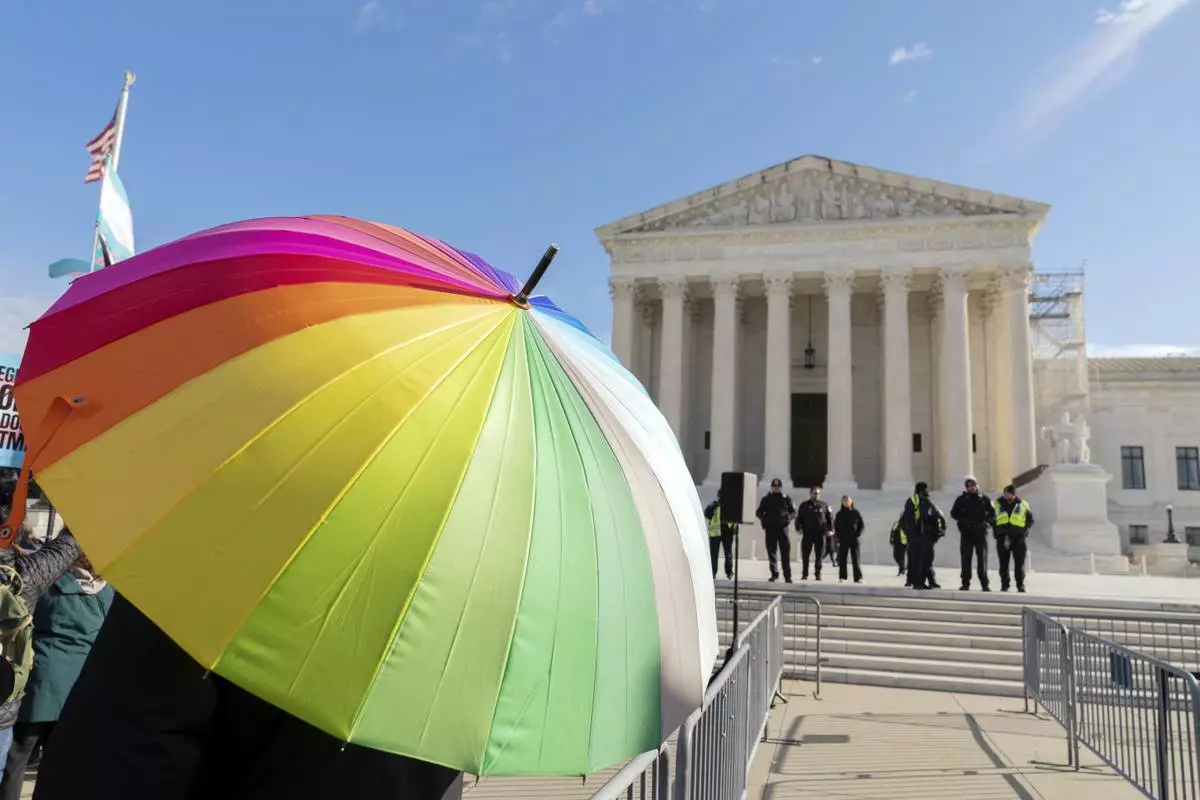
Supporters for transgenders rights protest during a rally outside of the Supreme Court, Wednesday, Dec. 4, 2024, in Washington. The Supreme Court is set to hear arguments on the constitutionality of Tennessee's ban on gender-affirming care for transgender minors. (AP Photo/Jose Luis Magana)

FILE - Two teens challenging New Hampshire's new law banning transgender girls from girls' sports teams pose with their families and attorneys in Concord, N.H., Monday, Aug. 19, 2024, after a judge granted an emergency request to allow one of the girls to play soccer while their lawsuit continues. (AP Photo/Holly Ramer, File)

FILE- The San Jose State University Spartans line up for their NCAA Mountain West women's volleyball game against the Colorado State University Rams in Fort Collins, Colo., on Thursday, Oct. 3, 2024. (Santiago Mejia/San Francisco Chronicle via AP, File)











